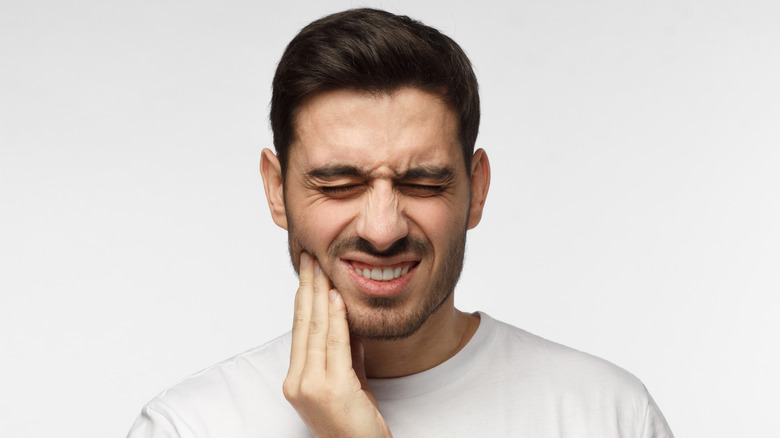You Should Stop Chewing Gum If This Happens To You
Millions of Americans chew gum. Over 160 million did so in 2020, according to Statista. There are many reasons people choose to chew. Some who engage in the activity believe chewing gum can help them get a more chiseled-looking jaw, although health experts have debunked this rumor (via Healthline). Others chew gum with the goal of burning fat and losing weight. According to WebMD, several studies do indeed indicate that chewing gum can potentially control your appetite and reduce cravings for unhealthy treats.
For others, chewing gum may simply be a longtime habit. Whatever the reason, chewing gum comes with benefits, such as teeth whitening, an improvement in the flow of saliva, the mitigation of bad breath, and tooth decay prevention (per Valley Dental Health). However, there are times when chewing gum can negatively impact your health. According to the Flushing Hospital Medical Center, chewing gum excessively comes with the possibility of overworking your jaw, leading to uncomfortable consequences.
How chewing gum can be harmful to your health
If you overwork your jaw, you can develop painful spasms that lead to a condition called temporomandibular dysfunction (TMD), also referred to as TMJ. The "J" refers to the affected joint that hinges your jawbone to the bones in your skull. Your jaw acts as a shock absorber while you chew. If you have TMD, the temporomandibular joints on either side of your head are out of alignment due to the jaw becoming overstressed. Symptoms of TMD can include pain in your head, neck, and jaw. You may also experience popping or clicking sounds in your jaw.
Headaches are another danger that can result from gum chewing, particularly in children and teens. A 2014 study published in Pediatric Neurology linked excessive gum chewing to chronic headaches. Out of 30 total participants in the study, 26 experienced either total resolution or partial improvement of their headaches when they refrained from chewing gum.
If you are a devoted gum-chewer looking to kick the habit, Livestrong suggests a few steps. First, try to lower your overall sugar intake to reduce your gum cravings. Also, try to chew your current piece of gum for longer, and cap your gum-chewing to two sticks per day. Finally, try substituting fennel or sunflower seeds for gum to keep your mouth busy without overworking your jaw. Taking these steps may help curb your gum cravings, but if you're having trouble, be patient — and don't chew yourself out.


